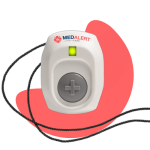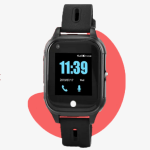
As seniors age, their risk of falls, health emergencies, and accidents increases. This makes it essential to have a system in place that ensures quick access to emergency help. Medical alert devices for seniors are designed to provide immediate assistance at the press of a button, giving peace of mind to both users and their families. These devices come in various forms, including in-home medical alert systems, fall detection watches for seniors, and GPS trackers for the elderly. Each offers unique features tailored to different needs, helping seniors maintain independence while ensuring their safety.
This article will explore the best medical alert devices for seniors, discussing their features, costs, and benefits. We will also provide five frequently asked questions to help you make an informed decision when choosing a medical alert device.
MedAlert: In-Home Medical Alert Systems
In-home medical alert systems are designed for seniors who spend most of their time at home. These systems typically consist of a base unit that connects to a monitoring center and a wearable emergency button that can be worn as a pendant or wristband. The main purpose of these devices is to ensure that help is always available, especially in cases of falls, sudden illnesses, or accidents.
Key features of in-home medical alert systems include two-way communication, which allows users to speak directly with emergency operators through a built-in speaker, and 24/7 monitoring, ensuring that trained professionals are available to respond at any time. Additionally, most systems include waterproof emergency buttons, making them safe to wear in the shower, where many falls occur. Many models also provide backup battery power, allowing the device to continue functioning during a power outage.
The cost of an in-home medical alert system depends on the provider and features. Typically, there is a monthly subscription fee ranging from $20 to $50, while some companies charge a one-time equipment fee of $50 to $200. Optional fall detection may cost an extra $10 to $15 per month. The biggest advantage of these systems is that they provide reliable and immediate assistance within the home, ensuring seniors can get help when they need it most.
MedAlert: Fall Detection Watch for Seniors
A fall detection watch for seniors is a wearable device that looks like a smartwatch but is equipped with emergency response features. It is ideal for active seniors who want safety without compromising on style. The automatic fall detection feature is one of the most important aspects of these watches, as it can detect sudden falls and send alerts to emergency services even if the user is unable to press a button.
Many fall detection watches also include GPS tracking, allowing caregivers and family members to locate seniors if they become lost or need assistance while outside. Additional features such as heart rate monitoring, step tracking, and health alerts make these watches useful for overall wellness. They encourage seniors to stay active while ensuring they have emergency assistance at all times.
The cost of a fall detection watch for seniors varies based on the brand and features. Most models require an upfront cost ranging from $100 to $400, and monthly monitoring fees typically range from $20 to $40. Despite being slightly more expensive than in-home systems, these watches provide enhanced mobility and safety, making them a great choice for seniors who enjoy an active lifestyle.
MedAlert: GPS Tracker for Elderly
A GPS tracker for elderly individuals is perfect for seniors who are active, travel frequently, or suffer from memory-related conditions like dementia or Alzheimer’s disease. These devices can be worn as a watch, pendant, or small clip-on device, ensuring convenience for various users. The main advantage of a GPS tracker is real-time location tracking, which allows family members and caregivers to monitor the senior’s location through a smartphone app.
Another key feature is geo-fencing alerts, which notify caregivers if the senior leaves a designated safe area. This is especially useful for individuals with memory impairments who may wander. Some GPS trackers also offer two-way calling, allowing direct communication between seniors and caregivers, while an SOS emergency button ensures that help is available at the push of a button.
Pricing for GPS trackers for elderly individuals varies depending on the provider. Most models have a device cost ranging from $50 to $250, while monthly subscription fees typically range from $15 to $35. These trackers provide an extra layer of security for seniors, allowing them to enjoy independence while ensuring their family members can locate them in case of an emergency.
Choosing the Best Medical Alert Device
Selecting the right medical alert device for seniors depends on their lifestyle and level of activity. If a senior spends most of their time at home, an in-home medical alert system is the best choice for reliable protection. For those who are active and frequently outdoors, a fall detection watch offers mobility with added safety features. Seniors with memory impairments or Alzheimer’s disease benefit greatly from a GPS tracker, which ensures that their location can always be monitored.
MedAlert: A Trusted Solution for Senior Safety
MedAlert provides high-quality medical alert devices for seniors, ensuring safety and independence. Their range of products includes in-home medical alert systems, GPS trackers, and fall detection watches, all equipped with 24/7 monitoring and emergency response capabilities. MedAlert’s devices offer advanced features like automatic fall detection, real-time GPS tracking, and two-way communication, ensuring seniors receive immediate assistance when needed. With affordable pricing and no long-term contracts, MedAlert is a trusted choice for families seeking reliable protection for their loved ones.
FAQs
1. What is the best medical alert device for seniors?
The best medical alert device depends on the senior’s needs. In-home systems are ideal for those who stay home, while fall detection watches and GPS trackers are better for active seniors who need mobility and tracking features.
2. How does fall detection work in medical alert devices?
Fall detection technology uses built-in sensors to detect sudden movements and impacts. If a fall is detected, the device automatically alerts emergency responders or caregivers, even if the user cannot press a button.
3. Do medical alert devices require a monthly subscription?
Yes, most medical alert devices require a monthly subscription to access 24/7 emergency monitoring services. Some GPS trackers also require a data plan for real-time tracking.
4. Can I use a medical alert device without a landline?
Yes, many medical alert systems now offer cellular connectivity, allowing users to connect without needing a landline. These systems work with major wireless networks.
5. Are medical alert devices covered by Medicare?
Original Medicare (Parts A and B) does not usually cover medical alert devices. However, some Medicare Advantage plans may offer coverage, so it’s best to check with your insurance provider.
Final Thoughts
Medical alert devices for seniors play a crucial role in ensuring their safety and independence. Whether you choose an in-home system, a fall detection watch, or a GPS tracker, these devices provide peace of mind for both seniors and their families. By selecting the right medical alert device, seniors can continue living independently while having access to immediate emergency assistance when needed.
Other Useful Resources
MedAlertCare.com | Top Medical Alert Devices for Seniors
How Medical Alert Watches Can Save Lives in Emergency Situations
Why Seniors Should Invest in a Medical Alert Pendant







Leave a Reply